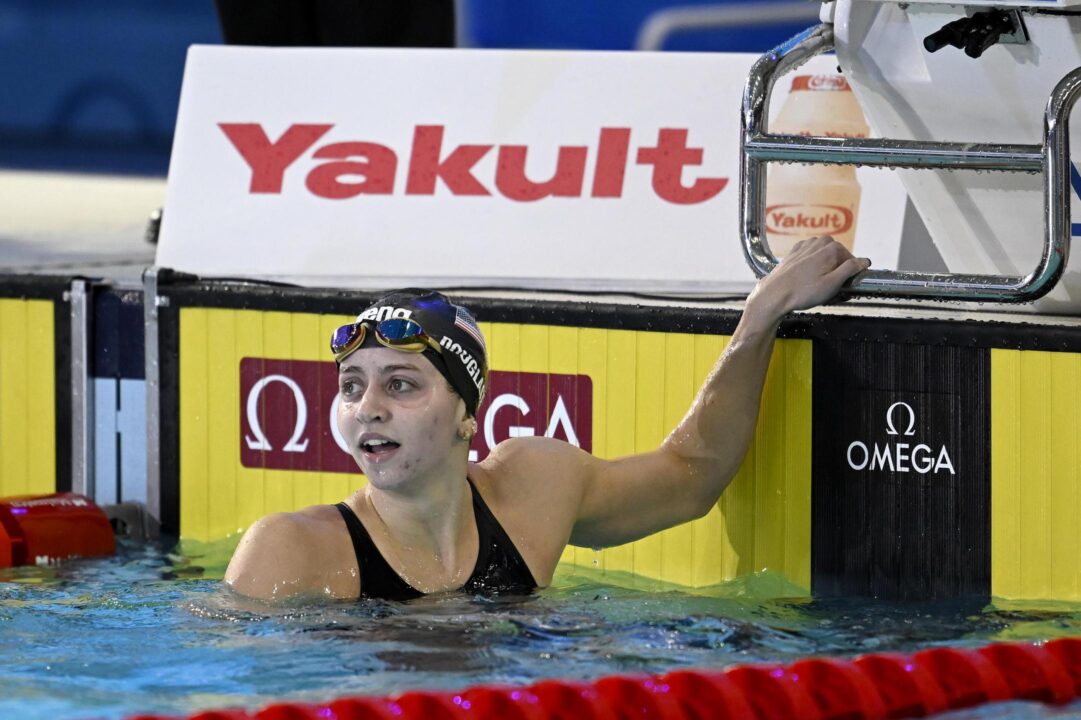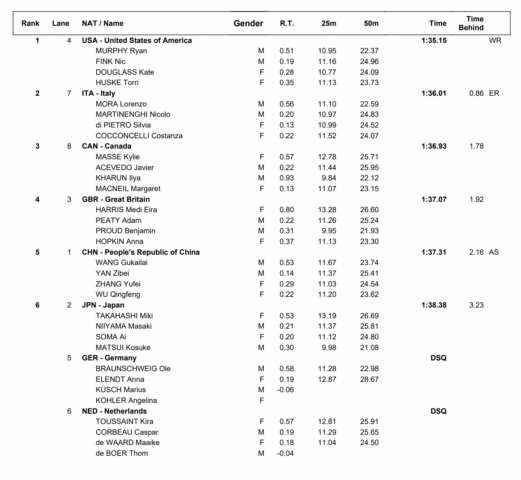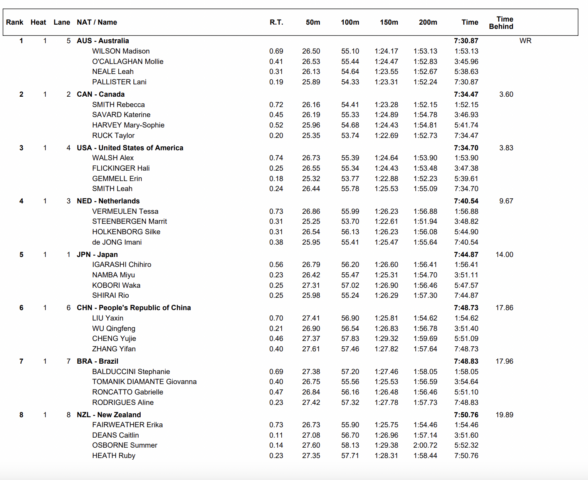2022 FINA SHORT COURSE WORLD CHAMPIONSHIPS
- Tuesday, December 13 to Sunday, December 18, 2022
- Melbourne Sports and Aquatics Centre, Melbourne, Australia
- SCM (25m)
- Prize Money
- Meet Site
- Meet Schedule
- How To Watch
- Meet Roster Index
- Psych Sheets (Updated)
- Live Results
The world record run in relays continued on Day 2 of the Short Course World Championships in Melbourne, as all-time marks fell in the mixed 200 medley relay and women’s 800 free relay.
In the mixed medley, the U.S. quartet of Ryan Murphy, Nic Fink, Kate Douglass and Torri Huske knocked more than a second off the world record in a time of 1:35.15, while the Italian team also went under the previous mark and set a new European Record of 1:36.01.
In the women’s 800 free relay, the Aussies went nearly two seconds under the old record in a time of 7:30.87, as Madi Wilson, Mollie O’Callaghan, Leah Neale and Lani Pallister combined to win Australia’s first gold medal in the event since 2006.
There was no shortage of blistering splits in both races—let’s dive into the splits:
Note: Germany and the Netherlands were disqualified, but splits recorded prior to their DQs have been included. Germany’s butterfly swimmer jumped early, as did the Dutch freestyler.
MIXED 200 MEDLEY RELAY
50 Back Lead-offs – Men
| Swimmer | Country | Split |
| Ryan Murphy | USA | 22.37 |
| Lorenzo Mora | ITA | 22.59 |
| Ole Braunschweig | GER | 22.98 |
| Wang Gukailai | CHN | 23.74 |
50 Back Lead-offs – Women
| Swimmer | Country | Split |
| Kylie Masse | CAN | 25.71 |
| Kira Toussaint | NED | 25.91 |
| Medi Harris | GBR | 26.60 |
| Miki Takahashi | JPN | 26.69 |
Countries were split on strategy in terms of which gender should swim the lead-off leg in the mixed medley, as four men and four women were given backstroke duties.
Ryan Murphy and Lorenzo Mora set their teams up for success, as both went under their country’s existing national record in the 50 back, though the times won’t hold up as official due to them being recorded in a mixed event.
Murphy’s 22.37 50 back is under his American Record of 22.53, and Mora’s 22.59 is quicker than Michele Lamberti‘s Italian mark of 22.62. Whether or not these two can recreate these times in the individual race will be something to watch, as will their head-to-head battle.
Kylie Masse was the fastest among the female swimmers in 25.71, within a tenth of her personal best set last year en route to winning the individual silver medal (25.62).
50 Breast Splits – Men
| Swimmer | Country | Split |
| Nicolo Martinenghi | ITA | 24.83 |
| Nic Fink | USA | 24.96 |
| Adam Peaty | GBR | 25.24 |
| Yan Zibei | CHN | 25.41 |
| Caspar Corbeau | NED | 25.65 |
| Masaki Niiyama | JPN | 25.81 |
| Javier Acevedo | CAN | 25.95 |
50 Breast Splits – Women
| Swimmer | Country | Split |
| Anna Elendt | GER | 28.67 |
Clearly the optimal move, seven of eight teams opted to use a male swimmer on the breaststroke leg. All of them were under 26 seconds, but two men went sub-25.
Nicolo Martinenghi split a blistering 24.83 for the Italian team (0.20 reaction), and Nic Fink was 24.96 for the world record-breaking Americans (0.19 reaction).
The world record in the event sits at 24.95 from Turkey’s Emre Sakci, but per our research, Martinenghi’s 24.83 split is the second-fastest we’ve ever seen, with Ilya Shymanovich the fastest ever at 24.72, done on Belarus’ mixed medley relay at the 2021 European SC Championships. In a non-mixed event, Shymanovich has the fastest at 25.04.
Martinenghi and Fink both being under 25 seconds is exciting for what’s to come, as they’ll go head-to-head in the 100 breast final on Thursday and will lock horns later in the meet in the individual 50 breast.
Great Britain’s Adam Peaty wasn’t far off those two in a career-best 25.24, and Javier Acevedo kept the Canadian team in the mix despite breaststroke probably being his third-best stroke, splitting 25.95.
The Germans would end up getting disqualified, but Anna Elendt had a safe start and split a blistering 28.67, which is only 12 one-hundredths shy of the world record in the women’s individual event.
50 Fly Splits – Men
| Swimmer | Country | Split |
| Ben Proud | GBR | 21.93 |
| Ilya Kharun | CAN | 22.12 |
50 Fly Splits – Women
| Swimmer | Country | Split |
| Kate Douglass | USA | 24.09 |
| Maaike de Waard | NED | 24.50 |
| Silvia di Pietro | ITA | 24.52 |
| Zhang Yufei | CHN | 24.54 |
| Ai Soma | JPN | 24.80 |
The Brits, Canadians and Germans were the nations using a male swimmer on fly, though Marius Kusch jumped early for Germany. Great Britain and Canada both had some real fast legs, as Ben Proud was sub-22 in 21.93 and Ilya Kharun, the new World Junior Record holder in the 50 fly (22.28), wasn’t far back in 22.12.
Note: The results say that Kharun had a disastrous 0.93 reaction off the blocks, but then his opening 25 split was 9.84 (faster than Proud), which contradicts that and was likely a timing error.
On the women’s side, the incredibly versatile Kate Douglass put up a scintillating 24.09 butterfly split, nearing the fastest we’ve ever seen, which is the 23.96 Sarah Sjostrom dropped last year in Abu Dhabi.
Douglass won’t race the 50 fly individually, but her split (with a 0.28 reaction) is well under the flat start world record of 24.38, which has been on the books for 13 years.
Three other women split 24.5, indicating we’re in for a great race in the 50 fly later in the meet, even though Douglass won’t be a contender.
50 Free Splits – Men
| Swimmer | Country | Split |
| Kosuke Matsui | JPN | 21.08 |
50 Free Splits – Women
| Swimmer | Country | Split |
| Maggie MacNeil | CAN | 23.15 |
| Anna Hopkin | GBR | 23.30 |
| Wu Qingfeng | CHN | 23.62 |
| Torri Huske | USA | 23.73 |
| Costanza Cocconcelli | ITA | 24.07 |
Maggie MacNeil anchored the Canadians home in 23.15 to earn them the bronze medal over Great Britain, which had Anna Hopkin throw down a 23.30 as the two battled stroke-for-stroke the entire race.
WOMEN’S 800 FREE RELAY
Lead-off Splits
| Swimmer | Country | Split |
| Rebecca Smith | CAN | 1:52.15 |
| Madi Wilson | AUS | 1:53.13 |
| Alex Walsh | USA | 1:53.90 |
| Erika Fairweather | NZL | 1:54.46 |
| Liu Yaxin | CHN | 1:54.62 |
| Chihiro Igarashi | JPN | 1:56.41 |
| Tessa Vermeulen | NED | 1:56.88 |
| Stephanie Balduccini | ITA | 1:58.05 |
Rebecca Smith showed good form in leading off Canada’s 800 free relay, resetting her national record in the 200 free with a time of 1:52.15.
Smith won silver in the event at last year’s Worlds in 1:52.24, and will be a threat to once again make the podium based on her swim here.
Madi Wilson was once again a reliable contributor for Australia, though her 1:53.13 was nine-tenths shy of the best time she set last month in Indianapolis (1:52.23).
Alex Walsh has put her versatility on display numerous times in the NCAA, but she got the opportunity to do here on the international stage and did not disappoint, keeping the Americans near the front of the race with a 1:53.90 showing.
After setting a new National Record for New Zealand with a 1:54.24 lead-off in the prelims, Erika Fairweather neared that mark here in 1:54.46.
Flying Splits
| Swimmer | Country | Split |
| Marrit Steenbergen | NED | 1:51.94 |
| Erin Gemmell | USA | 1:52.23 |
| Lani Pallister | AUS | 1:52.24 |
| Leah Neale | AUS | 1:52.67 |
| Taylor Ruck | CAN | 1:52.73 |
| Mollie O’Callaghan | AUS | 1:52.83 |
| Hali Flickinger | USA | 1:53.48 |
| Miyu Namba | JPN | 1:54.70 |
| Katerine Savard | CAN | 1:54.78 |
| Mary-Sophie Harvey | CAN | 1:54.81 |
| Leah Smith | USA | 1:55.09 |
| Imani de Jong | NED | 1:55.64 |
| Silke Holkenborg | NED | 1:56.08 |
| Waka Kobori | JPN | 1:56.46 |
| Gabrielle Roncatto | BRA | 1:56.46 |
| Giovanna Tomanik Diamanate | BRA | 1:56.59 |
| Wu Qingfeng | CHN | 1:56.78 |
| Caitlin Deans | NZL | 1:57.14 |
| Rio Shirai | JPN | 1:57.30 |
| Zhang Yifan | CHN | 1:57.64 |
| Aline Rodrigues | BRA | 1:57.73 |
| Ruby Heath | NZL | 1:58.44 |
| Cheng Yujie | CHN | 1:59.69 |
| Summer Osborne | NZL | 2:00.72 |
Marrit Steenbergen has quietly been on fire through two days in Melbourne, and after establishing a personal best time en route to qualifying for the final of the women’s 100 freestyle, she dropped the top split in the field with a 1:51.94 swimming the second leg on the Dutch 800 free relay.
Steenbergen’s flat start best time is 1:52.75.
Junior standout Erin Gemmell had the second-fastest flying leg at 1:52.24 for the U.S., which moved them up into the silver medal position heading into the anchor leg.
Gemmell and Steenbergen will both be podium contenders later on in the 200 free.
Distance ace Lani Pallister was also 1:52.2 for the Aussies, anchoring them to the world record, while Taylor Ruck came home in 1:52.73 for the Canadians to run down Leah Smith (1:55.09) and pick up the silver medal.



Very curious to see the men’s medley relays…great battles between the US and Italy
The problem with these fast 50s for Douglass in short course is that it continues to make her want to pursue the sprint 50 in long course. Alex Walsh made reference to that in her interview after the 200 individual medley. The first thing she said was that Douglass prefers 50 freestyle. After Tokyo, Douglass made two bold choices to pursue 200 breaststroke and 50 freestyle. But she can’t be stubborn enough not to concede that only the breaststroke translates to long course medal opportunity. Even if she made the American team she’s not explosive or long enough to deal with McKeon or Sjostrom, etc.
MacNeil split 23.11 anchoring the winning 4×50 mixed freestyle in Abu Dhabi
Kate Douglass? nah more like Kate Dublass, the lass with all the W’s
would it make sense to go huske fly and douglass free for the 200 medley? i could see the difference between them being bigger on the free leg based on this.
Kate Douglass for President
Another comparison: Douglass’ 24.09 fly split (with a .28 reaction time) seems more impressive than Huske’s and MacNeil’s 24.64s (with a .59 reaction time for Huske and .64 for MacNeil). This is purely theoretical, obviously, but if you give them all a 0.00 reaction time, that leaves you with a 23.81 for Douglass, 24.00 for MacNeil, and 24.05 for Huske. I suppose the counterargument is that for Huske and MacNeil, it was their third hard 50 fly in a day and a half. Then again, Douglass had two hard 200 IMs the day before. So, who knows. But hard not to think Douglass would likely have won that race.
IMO the relay start advantage is more than just improved reaction time. The ability to be moving forward with both feet pushing off the front of the blocks is also a lot better position for a power leap forward into the start.
Sorry, but this metric is not valid at all. You cannot compare a relay split to a flat start final for so many reasons, so many factors. Douglass is in sparkling form but we must beware the hype— skeptical of people here saying she could have won the 200 IM in Budapest, ie beat Walsh, ie basically go 2:06? Problem is her backstroke. . . In LC there are less walls…
American hero Nic Fink. Just gotta hope he can maintain this form for the next 18 months.